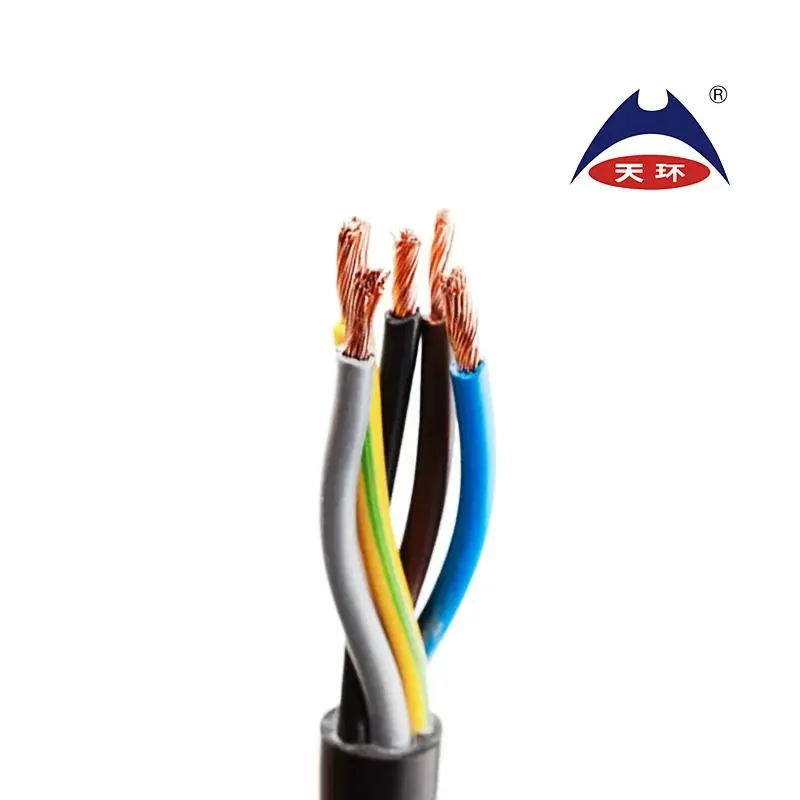
Maintenance of Rubber Flexible Cable
Proper maintenance of butyl cable, silicone rubber cable, and rubber flexible cable is essential for ensuring long-term performance and safety in various industrial applications. As a leading manufacturer with ISO 9001 certification, Tianhuan Cable Group provides professional maintenance guidelines for our premium rubber cable products, helping customers maximize service life and maintain optimal performance.

Butyl Cable Inspection Procedures
- Visual examination - Regularly check butyl cable surfaces for cracks, cuts, or abrasions that may compromise insulation integrity
• Flexibility testing - Verify rubber flexible cable maintains proper pliability without signs of hardening or stiffness
• Connection points - Inspect terminations and joints in silicone rubber cable for signs of overheating or corrosion
• Environmental assessment - Monitor conditions where butyl cable operates for excessive heat, chemicals, or moisture
• Documentation review - Maintain records of all rubber flexible cable installations and previous inspections
Silicone Rubber Cable Cleaning Methods
- Surface cleaning - Use mild detergent solutions for cleaning silicone rubber cableexteriors without damaging the material
• Contaminant removal - Immediately remove oil, grease, or chemical spills from rubber flexible cable surfaces
• Drying procedures - Ensure proper drying of butyl cable after cleaning or exposure to moisture
• Abrasive avoidance - Never use harsh scrubbing tools on silicone rubber cable surfaces
• Specialized cleaners - Select cleaning products compatible with rubber flexible cable materials
Rubber Flexible Cable Storage Guidelines
- Temperature control- Store rubber flexible cable in environments between -20°C to 40°C
• Humidity management - Maintain dry storage conditions for butyl cable to prevent moisture absorption
• Reel positioning - Store silicone rubber cable on proper reels to avoid kinks or deformation
• Sunlight protection - Shield rubber flexible cable from direct UV exposure during storage
• Inventory rotation - Implement first-in-first-out system for butyl cable stock

Butyl Cable Repair Techniques
- Minor damage repair - Use approved silicone rubber cablerepair kits for small nicks or abrasions
• Insulation restoration - Apply compatible liquid rubber compounds to damaged rubber flexible cable areas
• Professional assistance - Consult Tianhuan technicians for major butyl cable repairs
• Temporary solutions - Employ proper waterproof tape for emergency silicone rubber cable repairs
• Replacement criteria - Replace rather than repair severely damaged rubber flexible cable sections
Silicone Rubber Cable Performance Testing
- Insulation resistance- Periodically test silicone rubber cable dielectric strength
• Continuity checks - Verify conductor integrity in rubber flexible cable installations
• Flexibility assessment - Confirm butyl cable maintains required bending capabilities
• Load testing - Check silicone rubber cable under operational conditions
• Thermal imaging - Use infrared cameras to detect hotspots in rubber flexible cable runs
Butyl Cable FAQS
Q: How does butyl cable compare to silicone rubber cable in moisture - resistant applications?
A: Butyl cable features butyl rubber insulation, renowned for its exceptional water and vapor barrier properties, making it ideal for underwater or high - humidity environments like marine installations or subterranean wiring. Silicone rubber cable, while heat - resistant, offers moderate moisture resistance but excels in extreme temperatures. For projects requiring both moisture and heat protection, butyl cables with silicone overjackets combine the best of both materials.
Q: What industries benefit most from rubber flexible cable and butyl cable for durability?
A: Rubber flexible cables thrive in industries needing frequent movement, such as robotics or conveyor systems, due to their bend - resistant design. Butyl cables add chemical and weather resistance, making them vital in oil refineries, chemical plants, or outdoor construction where exposure to solvents or harsh climates is common. Both types reduce downtime from cable failure, but butyl’s resilience extends service life in corrosive conditions.
Q: How do manufacturers ensure the flexibility of silicone rubber cable and rubber flexible cable?
A: Silicone rubber cables use cross - linked silicone compounds that maintain elasticity across a wide temperature range (-60°C to 200°C), perfect for applications like oven wiring. Rubber flexible cables often incorporate braided shields or multi - stranded conductors to enhance bendability, suitable for portable tools or machinery with moving parts. Look for cables certified to IEC 60245 for flexible rubber insulation standards to guarantee performance.
Q: Can butyl cable and silicone rubber cable be used in food - processing environments?
A: Yes, but with specifications. Butyl cable with FDA - compliant compounds is suitable for direct contact with food, resisting oils and cleaning agents. Silicone rubber cable offers non - toxic, odorless properties and high thermal stability, ideal for bakery equipment or commercial kitchens. Always verify that the cable’s insulation and jacket materials meet NSF/ANSI 51 standards for food - zone applications.
Q: What installation tips maximize the lifespan of rubber flexible cable and butyl cable?
A: For rubber flexible cables, avoid tight bending radii (ideally 8 - 10x the cable diameter) and use strain relief glands to prevent conductor fatigue. Butyl cables in outdoor settings should be installed in UV - resistant conduits to protect against ozone degradation. Both types benefit from regular inspections for abrasion, especially in high - flex zones, and maintaining proper spacing between cables to prevent heat buildup.
Welcome to Tianhuan Cable Group Co., where innovation meets reliability! Since 2000, we've been powering progress from Ningjin County, Hebei, with a massive 302 million CNY registered capital and 110,000㎡ facilities. Our 15 advanced low-voltage production lines and 3 automated rubber lines ensure 100% qualified cables, trusted by State Grid, China Railway, and global clients across 28 Chinese provinces and international markets.
Crafting XLPE power cables, fire-resistant solutions, and custom wires, our ISO 9001/14001/45001-certified products blend "quality for survival, reputation for growth." With 30+ precision instruments and 97% satisfaction, we're not just manufacturing cables—we're engineering connections for smart grids, renewables, and infrastructure.
Join 200+ top industry peers and experience punctual delivery + 360° service. Light up your projects at www.thcable.com —where every cable carries 24 years of electrifying excellence.
-
Reliable LIYCY Cable Solutions for Low and Medium Voltage ApplicationsAħbarijietJul.14,2025
-
Premium Overhead Electrical Wire Solutions for Low and Medium Voltage ApplicationsAħbarijietJul.14,2025
-
Innovative XLPE Electrical Cable Solutions for Modern Low and Medium Voltage NetworksAħbarijietJul.14,2025
-
High-Quality Ethylene Propylene Rubber Cable – Durable EPDM Cable & 1.5 mm 3 Core OptionsAħbarijietJul.14,2025
-
Exploring the Versatility of H1Z2Z2-K 1X4mm2 Cables in Modern ApplicationsAħbarijietJul.14,2025
-
Uses of Construction WiresAħbarijietJul.14,2025
-
Types of Neoprene CableAħbarijietJul.14,2025














